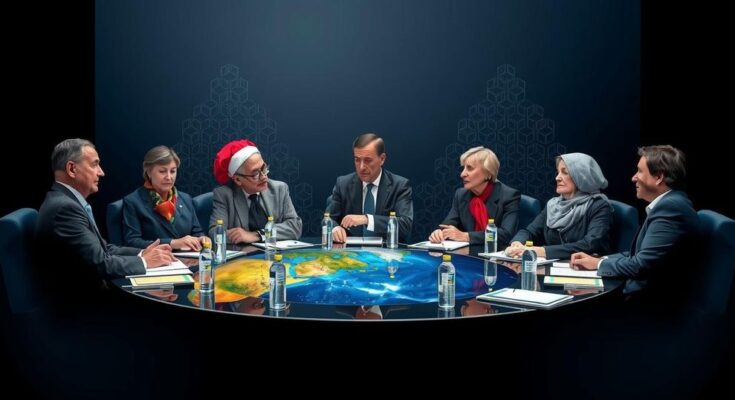During the G20 summit in Rio, leaders addressed global issues such as climate change, poverty, and the conflicts in Gaza and Ukraine, achieving a narrow consensus on humanitarian responses. They emphasized the urgency of civilian aid and ceasefires as Trump’s return to power looms, potentially impacting U.S. foreign policies. Brazilian President Lula underscored the need for a global alliance against hunger and poverty, highlighting significant shifts in the global economic landscape as developing nations seek greater representation.
Leaders from the G20 convened in Rio de Janeiro to confront pressing global challenges including climate change, poverty, and ongoing conflicts in Gaza and Ukraine. During the two-day summit, they reached a fragile consensus on humanitarian issues, urging for immediate civilian aid, a ceasefire, and a unified international response in the face of escalating tensions. Tensions were palpable, particularly as discussions were overshadowed by the anticipated return of Donald Trump as U.S. President, whose policies may counter current multilateral efforts. Amid a significant humanitarian crisis triggered by the Ukraine conflict and the situation in Gaza, the G20 leaders acknowledged the urgent need for a cohesive response. Their joint statement reaffirmed concerns over the humanitarian situations in both regions, with a particular focus on the dire conditions in Gaza, advocating for comprehensive support and urgent ceasefires. The discussions were marked by extensive negotiations, reflecting the complexities of achieving consensus across diverse global perspectives. Significantly, the summit highlighted Brazil’s initiatives under President Luiz Inacio Lula da Silva, emphasizing the importance of combating poverty and hunger through a global alliance backed by over 80 nations. President Lula passionately argued against the notion that hunger is a byproduct of scarcity, asserting that it stems from political choices. “Hunger and poverty are not the result of scarcity or natural phenomena … they are the product of political decisions,” he stated. As the summit unfolded, leaders from emerging economies expressed a desire to reshape global dialogue, acknowledging the growing influence of developing nations. German Chancellor Olaf Scholz noted that these countries are increasingly voicing their concerns and will no longer accept the status quo dictated by historical powers. Chinese President Xi Jinping also seized the opportunity to announce initiatives supporting the Global South, reinforcing China’s economic footprint amid the uncertainty of a shift in U.S. foreign policy. Meanwhile, President Joe Biden, deemed a lame duck with limited time left in office, struggled to navigate escalating international conflicts while contending with Trump’s impending influence. The summit underscored a pivotal moment in global governance as leaders grappled with preserving multilateral approaches in an evolving geopolitical landscape.
The G20, comprising the world’s major economies, plays a critical role in addressing global issues collaboratively. The recent summit in Rio highlighted significant challenges such as climate change, economic disparities, and ongoing international conflicts. The anticipated return of Donald Trump to the presidency underscores tensions within the G20, as his administration may pursue policies that diverge from collective international efforts. Brazilian leadership under President Lula has sought to expand the G20’s focus on poverty and climate initiatives, indicating a shift towards more inclusive global discourse, particularly relevant in the context of rising economies seeking greater influence.
The recent G20 summit in Rio de Janeiro marked a crucial exchange of views among global leaders addressing substantial issues—economic inequality, humanitarian crises, and climate change—while being overshadowed by political uncertainties linked to Donald Trump’s forthcoming presidency. The G20’s fragile consensus on supporting vulnerable populations amidst geopolitical tensions reflects a growing push for multilateral cooperation, emphasized by Brazil’s leadership in advocating for poverty alleviation and climate action. The future of international engagement remains uncertain, with emerging economies aiming to redefine the global narrative.
Original Source: www.france24.com




